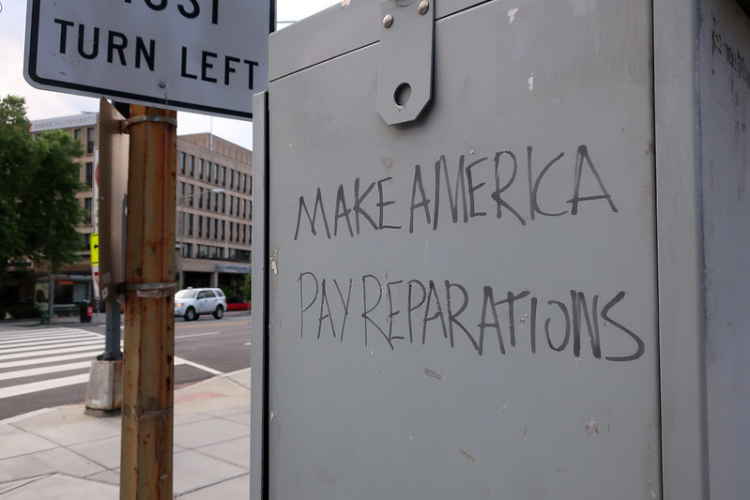Reparations Now

If you haven’t been paying attention to the Democratic primaries in the United States, you might have missed the fact that reparations, payment made to the descendants of enslaved African people brought to the US, have been a talking point.
If you’re a Black person in the US, the word reparations has been the butt of jokes your whole life. Most Black people I know don’t believe reparations will ever be made, feelings based on the behavior of White people over the last few centuries. Better not waste hope.
However, people have been continually fighting for reparations for over 150 years. Since 1865, just two years after the passing of the Emancipation Proclamation, which formally ended slavery.
Strictly speaking, the dictionary defines reparations as, “the action of making amends for a wrong one has done, by providing payment or other assistance to those who have been wronged.” It is a common idea. Many countries such as Germany, France, Canada, Austria, and South Africa have paid reparations to groups of people who have been wronged within their borders.
In fact, the United States is no stranger to reparations. At both national and local levels reparations have been paid for various reasons. For example, following WWII the US Government paid reparations to the Japanese who had been held in internment camps, as well as to the Aleuts in Alaska, for the occupation of their territory during the same period. The US also paid over $10 million to the survivors and families of the men from the “Tuskegee Study of Untreated Syphilis in the Negro Male,” although this came after they faced a class-action lawsuit.
Today, unfortunately, the rhetoric coming from some candidates is that a cash payment should not be considered at all. This stance argues it would be too difficult to calculate or figure out who is eligible, that it’s better to focus on structural changes. This sort of defense should make voters skeptical of their true motivations because some economists have come up with various models that illustrate how reparations could be made.
Yes, the US needs to make structural changes. And yes, these should include reparations. The payment component however, is essential. The wealth of the US was built on the backs of the enslaved. Ever since the practice of enslaving people ended, black people have faced outright (find a violence link)violence and hate for merely attempting to take part in the “American Dream.”
Reparations need to be paid. Even if institutional change happens, there is still a huge generational wealth gap between white and black Americans. According to a 2019 report done by McKinsey & Company, “The average median white family has more than 10 times the wealth of the median black family.” This translates into a $154,000 gap between the average white family and black family.
Why does this matter? It matters because all this time, over 156 years since owning people was made illegal, White families have been able to accumulate wealth and pass it on to their progeny. This generational wealth transfer has supported the flourishing of the White community such that the Black community could never compete, no matter how hard they tried.
Image Credit: Kjartan Einarsson via Unsplash
It would have been a whole lot easier to have paid reparations back in 1865. However, at that time the white supremacists in power preferred to avoid apologizing and making an effort towards reconciliation.
A lot of people, Black people included, are against reparations for various reasons. Some people say it will divide the country even more. Others claim that a price cannot be put on the suffering endured. I believe these arguments are based on deeply embedded beliefs that ignore the facts. I attribute it to insufficient education on the history of enslavement in the US, specifically, as concerns reparations.
It’s almost as if the people descended from the enslavers hope that eventually, the descendants of the enslaved will just drop the subject. But reparations can not be forgotten. The crimes against humanity and their lasting effects are horrendous. The subject of paying reparations can’t be dropped so easily.
Just because people today do not have firsthand responsibility in the keeping of enslaved people doesn’t mean they don’t have a responsibility to right the actions of their ancestors. Happily reaping the benefits of a nation built on the backs of the enslaved while denying any wrongdoing is akin to being born into a family of crime and acting like participating in the family business is not breaking the law.
The complicated question is not whether reparations should happen, but how to determine who receives what. Obviously, in present time, Black Americans are not exclusively the descendants of the enslaved people brought to the US. While it is undeniable that any person of color is and has been a victim of the white supremacy ideology in the US, many proponents of reparations feel strongly that descendants of African immigrants to the US should not be included in reparations, should they eventually take place.
This invokes the question of DNA testing, and I’m not sure how I’d feel about being tested in order to qualify for reparations. Let’s see how much they’re talking about first.
I know this is a sensitive topic to read about. It wasn’t easy to write. If you’re White and reading this, I hope you’re not mad. If you want to be mad, be mad at your ancestors for committing such atrocities. Don’t be mad at the descendants of the enslaved for wanting and asking for a more even playing field.
At some point, this cycle needs to break. It’s more difficult all these years later, but not impossible. Perhaps the 2020 election will kick this debate onto the fast track.








